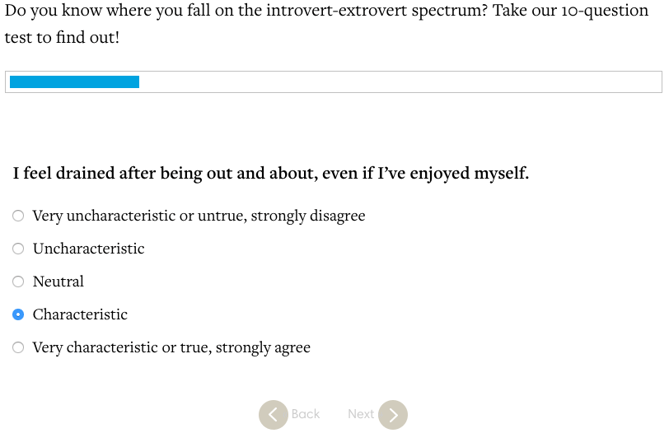
What do you think of when you see the word "introvert"?
"Shy," "quiet," and even "antisocial" might be some qualities that come to mind. But we've got news for you: How we think of introverts is pretty misconstrued from the actual definition. An introvert, according to Dictionary.com, is "a person characterized by concern primarily with his or her own thoughts and feelings." Let's explore that.
Looking at that definition, introverts aren't necessarily the timid lambs that stereotypes make them out to be. Rather, they're introspective individuals who can still be outgoing -- they just don't crave being around other people, speaking and presenting, all the time. 
That's why it might be a bit trickier for introverts to run a meeting -- not because they're reticent, but because they take extra time to process their internal thoughts and surroundings, according to Quiet Revolution, an organization dedicated to the science of psychological introversion.
But "tricky" certainly doesn't translate to "impossible." So if you're an introvert who's been charged with a running a meeting, check out these tips.
But First, a Little More on Introversion
I’ll never forget the day I found out that I might be an introvert. I came across an article that described the characteristics of introverts, and realized that they many of my social patterns -- things like enjoying quiet time to myself, or in a social situation, opting for longer conversations with fewer people (rather than small talk with tons of strangers).
But how could I be an introvert? I was a theatre minor. I used to sing with a punk band. Those were not things that introverts do, right?
Wrong. The more research I do on introversion, the more I realize that it’s a vastly misunderstood population. And it’s a big population. According to the Quiet Leadership Institute (an extension of Quiet Revolution), half of the U.S. workforce identifies as introverts.
Susan Cain, co-founder of Quiet Revolution, explored these misconceptions in her 2012 TED talk. I, like many others, had introversion confused with shyness, or maybe even stage fright -- neither of which I’ve ever possessed. But introversion, she explained, is “different from being shy. Shyness is about fear of social judgment. Introversion is more about, how do you respond to stimulation, including social stimulation.”
That’s what makes us different from extroverts, who “crave large amounts of stimulation,” noted Cain. It’s not that introverts are afraid to lead meetings -- or speak in public, sing with a punk band, or go to parties alone. The distinction is how we prepare for or function in those situations.
But when it comes to introverts and extroverts, one isn't better than the other. Plus, according to Cain, the "best performing teams are a mix [of] introverts and extroverts."
So when it comes to those meetings, here are our tips for how introverts can run them in an effective way.
The Introvert's Guide to Running a Meeting
1) Know where you stand.
First things first: You might not even be sure where you stand on the introvert/extrovert spectrum. Guess what -- Quiet Revolution has a quiz for that.
For the purposes of this post, the assessment is probably most helpful for folks who don’t think -- or don’t want to accept -- that they’re introverts. But a quiz like this one can help you learn a lot about your behavioral patterns, and perhaps avoid a case of mistaken identity.

Source: Quiet Revolution
For example, according to the Quiet Leadership Institute, 96% of workforce leaders identify as extroverts. That implies a staggering imbalance among management, but could that number be the result of personal misconceptions similar to my own? Perhaps these leaders identify as such because they enjoy taking charge and overseeing groups. As we covered, introverts can still possess those qualities.
You might even be an ambivert -- someone who falls in the middle of the spectrum -- which after taking the quiz, I learned is the bucket into which I fall. In any case, having this information can help you recognize certain habits, which in turn can help you lead more effectively.
2) Set aside (quiet) time to form an agenda.
When I asked my team for meeting leadership tips, my colleague, Janessa Lantz, made an excellent point.
“Introverts often need time to prepare thoughts,” she told me. “By sending out an agenda in advance, you’re designing a more inclusive meeting.”
But planning a meeting this way doesn’t just benefit the attendees -- as considerate at that might be -- it also works to your advantage. Nearly 86% of people with introverted qualities agree that they “pay a lot of attention to the meaning of [their] thoughts and actions.” And while that can lead to a more thoughtful approach to things, it also requires extra time.
That’s where being the designated leader of a meeting is a good thing. You have the luxury of time to yourself, hopefully, to plan the meeting and put the necessary consideration into it. So don’t look at the task as a setback -- it’s actually an opportunity.
3) Lead with the topics you're passionate about.
Many introverted leaders admit that while social interaction doesn’t frighten them, prolonged exposure to it can leave them feeling less energized, due to their sensitivities to stimulation. That’s why, during a panel discussion on introversion at the 2016 New Work Summit, LinkedIn Chief Human Resources Officer -- and self-proclaimed introvert -- Pat Wadors recommended starting the meeting off with topics you’re most passionate about.
"If there's passion around a topic, I don't want to be in my head worried about, 'Will I be called on?’” Wadors explained. “I have a point of view. I will speak early. And then, my energy is spent really actively listening and being present." Check out the full discussion:
Here’s another opportunity for you to use running a meeting to your advantage. If there’s something that you strongly feel needs to be discussed, consider proactively scheduling a meeting that will be entirely dedicated to it. That allows you to dedicate extra time to a specific topic or project that’s important to you, and thoughtfully form an agenda with points that are vital to it.
But scheduling meetings comes with its own set of parameters, which brings us to our next point.
4) Invite only those who absolutely need to be present.
As we noted earlier, introverts tend to value quality over quantity in social situations. Meetings are no different. Instead of inviting the entire team, only invite the people who absolutely need to be there, and focus on having a productive conversation with them.
That technique goes beyond introversion -- after all, there’s a book out there called Meetings Suck for a reason. They’re a huge culprit when it comes to wasting time. Just look at these statistics from the Wrike Work Management Survey:
- 24% of employees cite meetings as their biggest productivity roadblock.
- 34% say that they attend six or more meetings per week.
- Only 9% of meeting attendees believe they always walk away with clear, actionable outcomes.
When you’re tasked with running a meeting, make sure it’s done efficiently, and help conserve the time of others wherever you can. Since introverts tend to thrive in situations that permit a higher-quality discussion with a fewer number of people, this approach should help make the meeting more productive and thoughtful.
5) Take your time during the meeting.
In the article “An Introvert's Guide to Communicating With Results,” entrepreneur and CEO Caren Merrick writes, “It is perfectly acceptable to not immediately answer a question.”
As long as we’re being honest, I’ll confess that I sometimes have a bad habit of speaking up in meetings or discussions, just for the sake of looking like I’m engaged. Trust me -- Don’t do that.
As per Merrick’s advice, it’s better to take your time to contribute something thoughtful to a conversation, even if you do so after the fact in a follow-up email or chat. In fact, you can even build that into your agenda, by dedicating a portion of the meeting to outlining next steps and “questions to be answered.” Then, make sure you schedule time for yourself to personally debrief what you took away from the meeting, and any further commentary you’d like to provide afterward.
That said, don’t take too long to follow up. With our growing to-do lists and shrinking attention spans, you’ll want to make sure the meeting is still somewhat fresh in your colleagues’ minds when they receive your notes.
6) Schedule time to decompress after the meeting.
In addition to setting aside post-meeting time to debrief, you might want to clear your schedule for time to decompress. Because of an introvert’s aforementioned sensitivity to stimulation, it’s often helpful to schedule a meeting and organize your day around it so that low-energy tasks follow it, or a re-charging activity, like having a quiet lunch break.
Permitting yourself that time to refuel -- even if it’s the rest of the work day -- will allow you to revisit items from your meeting when you’re clear-minded and energized. Chances are, your colleagues would prefer that your follow-up communication is thought-out, rather than immediate.
You’ve Got This
Now that you know what it really means to be an introvert, you might feel a little bit more empowered. With this information, not only can you go forward with a renewed sense of confidence, but also, you have a greater understanding of what helps you to be a strong leader.
And again -- Maybe you’re not actually an introvert, or you’re a mix of both. Wherever you fall on the spectrum, it’s important to understand what allows you to succeed.
Understanding these work styles won’t just give you introspective insights -- it can also make you a better leader with a greater comprehension of what’s best for your colleagues. As you plan and run these meetings, do so with your team in mind, and see how these approaches fit into the way they work.
So go ahead, do a little research. Next time you’re asked to run a meeting, you’ll be glad you did.
What helps you lead a meeting -- especially as an introvert? Let us know in the comments.
from HubSpot Marketing Blog https://blog.hubspot.com/marketing/introverts-guide-to-running-meetings


No comments:
Post a Comment